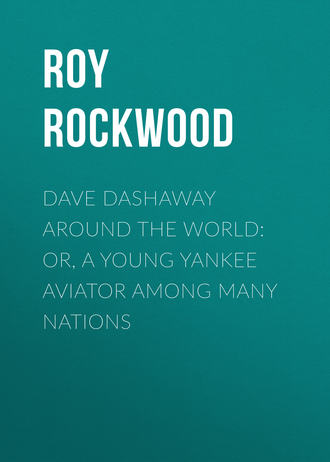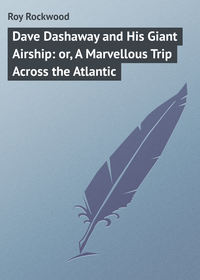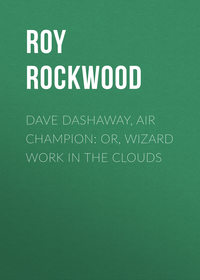
Dave Dashaway Around the World: or, A Young Yankee Aviator Among Many Nations
The Russian removed from his finger a large seal ring, and pressed it into the hand of Dave Dashaway.
CHAPTER XVIII
IN STRANGE LANDS
Dave and his boy friends had no cause to regret their meeting with Adrianoffski. Their stay at the trading station, brief as it was, had given new impetus and encouragement to the expedition. The Russian gave them points as to their route that enabled them to save time and distance. Besides that, he named places where they might stop and be assured of friendly and helpful service from his agents.
“I tell you, meeting Mr. Adrianoffski was fine luck,” said Hiram, enthusiastically, one morning, as they started up for the day’s flight. “We are pretty sure to reach Lhassa without much trouble; aren’t we, Dave?”
“To reach its vicinity, you mean,” corrected the young airman. “I am greatly depending on this Ben Mahanond Adasse to whom our Russian friend has directed us.”
They had left the severe wintry blasts behind them two days flight out of Mokiva. While the weather was not at all summery, the milder climate as they proceeded southward was in pleasing contrast to what they had endured in the bleak and barren solitude of Siberia.
So far everything had gone pretty close to the schedule the pilot of the Comet had laid out when they left Washington. They reached stations as planned. There was no trouble in securing gasoline and other supply stores. Then, too, there were pleasant breaks in their arduous flights. The ring Adrianoffski had given Dave acted magically when shown at depots along the route to which he had directed him.
It was at Kolyvan that a full day’s stop had to be made. There were some machine repairs necessary. Through telegrams and newspapers the airship boys were able to glean some information as to their competitors in the race. Out of the twelve that had started only four had reached Sitka. The closest rival was machine number seven, reported at that point six hours after the Comet had left.
The machine crossed Thibetan territory about noon time. Dave was able to determine this from charts, points given by Adrianoffski, and the contour of the district. It was an interesting panorama they viewed all the rest of that day. They passed over great camel trains traversing the barren plains. They had a chance to see the native yaks, trained to perform all the duties of horses. The extensive lamaseries, or monasteries, some of them built on the very apex of well-nigh inaccessible cliffs, amazed them.
The Comet was viewed by gaping groups whenever they passed over a settlement. Dave had a town called Zirva for his evening destination. It was near here that Ben Mahanond Adasse had his trading station. The young air pilot calculated upon arriving after dark. It might interfere with his plans to have the Comet publicly seen so near to the sacred city of mystery.
“Judging from the landmarks described by Mr. Adrianoffski,” said Dave, towards the middle of the afternoon, “I think we are quite near to Zirva.”
“That is the trading post of his partner?” spoke Hiram.
“Yes,” nodded the young aviator. “Those glittering spires and domes in the distance must be Lhassa. We must look for a secure and secluded landing place.”
This they found soon afterwards. It was at the edge of a rugged hill. Beyond it were some straggling settlements, but the Comet was screened from these as it approached the hill from the east.
“I don’t care about attracting the attention of the natives,” explained our hero. “They are quite fanatical, and have probably never seen an airship before. They might think it some demon of the air, or an infernal machine come to destroy their gods and temples.”
“Yes, I think myself we had better keep in the background as much as we can,” agreed Hiram. “It would be a pity to have a mishap now, with the hardest part of the route covered.”
“But how are you going to locate this Adasse?” inquired Elmer.
“According to what Mr. Adrianoffski told us,” replied Dave, “his station cannot be more than a few miles from here.”
“What’s your plan about finding him, Dave?” asked Hiram.
“Why, as soon as it gets dusk I will venture down into the valley there. You two will stay here on guard. Keep ready for a quick flight, if any of the natives discover the machine.”
The trio enjoyed the luxury of a grateful rest on the ground while they conversed. Hiram, speedy to recuperate and always active, strolled away from his comrades. He looked out over the country. Then he became interested in watching a man just below the point where the Comet had landed.
“Say fellows,” he observed briskly, coming back to his friends; “if you want to see something queer just take a peep over the edge of that rock yonder.”
“What is it, Hiram?” inquired Elmer.
“You have to come with me to find out,” was the reply. “I can’t imagine what a funny old fellow down below there is up to.”
“All right, we’ll take a look,” said Dave.
“There he is,” pronounced Hiram, after the others had followed him a little distance, and he pointed past a shelving rock.
On the level of the valley below a native was squatted before a flat boulder. He held in his hand a comical metal object with an ivory handle. He seemed turning the handle. The boys, even at the distance they were, could hear a click-clack sound, apparently proceeding from the device.
“Say, whatever is that contraption?” asked the puzzled Hiram.
“Looks like a cross between a nutmeg grater and a music box,” suggested Elmer.
Dave ventured no opinion. Like the others he continued to watch the curious pantomime of the native. The lips of the man moved incessantly, making a dull monotonous drone. Finally he placed the device on the stove before him and closed his eyes.
His body swayed and he flung his arms aloft. Then he bent his forehead clear to the ground. All the time he kept up a steady monotone.
Finally he arose to his feet and picked up a knapsack and a long, sharp-pointed spear. He was about to resume his way. Just then a huge bird resembling an eagle, only snowy white, sailed down from a tree on the hillside. It swooped over the boulder and made a peck at its surface. The next moment it soared aloft, the trinket in its bill.
The native uttered a wild, frantic shriek. Of a sudden he was transposed into a being denuded of reason. As the bird flew up over the crest of the hill, the man cast himself prostrate on the ground; writhing there in agony. Beating his head with his hands, his face distorted, he acted like some person in a fit.
“Well, that’s something odd to see,” began Hiram – “what is it, Dave?”
The young airman had watched the course of the thieving bird, eagle, macaw, crow, or whatever it was. He saw the bird sail along until its glance fell upon the biplane. Then it dropped to one of the wings. The bauble retained in its bill, it walked over to one of the seats, dropped its prize, and began pecking at the seat cushions.
Our hero was on his feet in an instant of time. He ran towards the machine, intent on scaring away the predatory intruder. Dave had picked up a stick. This he hurled at the bird. It gave a sullen croak and took to wing, disappearing on the other side of the hill.
The young airman was curious and interested enough to lean over into the body of the machine and secure the object dropped by the bird. He was viewing it critically and with some comprehension of its use, when his comrades joined him.
“What is it, Dave?” queried Hiram eagerly. “That old fellow below yonder is tearing up the ground and rolling all about in a fearful fashion.”
“I know what it is,” pronounced Dave, “and I think we had better get it back to its owner and save some mischief for him. This is what is called a prayer mill. See, this handle turns a silken scroll on a reel all covered with queer-looking characters. These represent the prayers the Thibetans make to their great idol, Da-Fan-Jan. The priests supply them to the worshippers. They are highly prized. I have read about them, and have seen pictures of these queer prayer mills, as they call them.”
“You’re not going down there to give it back to the native; are you?” asked Hiram; in some surprise, as Dave looked about him to discover the easiest way of descending the hillside.
“Yes, I think I had better,” was the reply. “You don’t know how these superstitious people value such charms. This prayer mill may have been cherished in that man’s family for centuries. It is regarded an heirloom, and the person losing it probably thinks he is condemned if he does not recover it.”
Our hero hurried his steps. Descending the hillside alone he chanced to glance at the native. The man had now arisen to his feet. All his violent manner had disappeared. His face wore a look of sullen despair.
He had taken his spear and fastened its end stoutly under an edge of the boulder in a slanting position. Its keen point showed breast high. The man had retreated some twenty feet. There he stood posed for a run. Dave recalled something he had read of the hari-kari of the rude Asiatic tribes. Suicide, swift and terrible, was the rule where some great loss, disgrace, or bereavement unsettled the mind.
“He means to impale himself with all his force on that spear point and end his life,” decided the young aviator. “Hoi-hoi!”
Just in time did Dave distract the native from his tragic purpose. He fairly tumbled down the hill as the man, running at full speed, had almost reached the waiting instrument of death. Dave’s shout made him waver. As he dangled the prayer mill towards the wretched man, the latter came to a pause like a statue.
The eyes of the native were glued to the amulet as if he was fascinated. To his overheated fancy Dave possibly suggested some “white god” sent from the clouds to restore the precious prayer mill.
The young airman came directly up to the native and extended the trinket. The dark, bony hand of the devotee reached out and clasped it. He burst into tears, kissed it, caressed it. He thrust it into his bosom, and raising his arms in wild gyrations began a shrill, joyful chant.
When it was concluded he cast himself on the ground. Crawling abjectly he embraced Dave’s knees. He lifted his eyes in gratitude.
A stout steel chain bearing at one end a serviceable watch and at its other the ring Adrianoffski had given Dave, met the glance of the grateful suppliant.
“Oi-e! oi-e!” he suddenly shouted. His fingers touched the ring. His eyes, showing an intelligence he could not express, rested on the face of the young aviator.
CHAPTER XIX
STRANGE COMPANIONS
Our hero was not slow in discovering that the native saw something in the ring he wore which centered his attention and interest. As Dave smiled and looked upon him in a friendly way, the man showed less strangeness and timidity.
He touched the ring now and arose to his feet. He again touched the ring and then two of his fingers. Dave fancied that he understood his companion. He believed that the man wished to inform him that there was another ring – two rings, both alike.
Then the native again inspected his restored prayer mill. He gazed at it fondly, with a great smile of joy. He pointed at the spear and shuddered and shrank away from it. Then he fairly beamed on the young airman. He dropped to the ground and placed Dave’s foot on his neck. He acted as if he wanted his new friend to know that he was his slave for life.
After the man had gone through all these manœuvers Dave held up the ring. The native made a motion to describe a long flowing beard. Adrianoffski wore such and doubtless his partner did also. Now our hero felt certain that not only was the ring familiar to the native, but likewise that he was telling that its duplicate belonged to Ben Mahanond Adasse, and that he knew the merchant.
“Where?” spoke Dave, and exhausted his pantomimic skill in trying to express the word in signs. He pointed first in one direction and then in the other. His companion followed every gesture he made intently, seeming anxious to understand what he meant.
The man pointed to the southwest, and moved his finger along the horizon. He tried to express distance. The young aviator by signs conveyed the idea that he wished to see the owner of the other ring, the man with long flowing beard.
The native nodded a dozen times with intelligence and satisfaction. He promptly took up his knapsack and spear and faced about, posed to assume the part of a guide.
The pilot of the Comet did not wish to leave his friends without apprising them of his intentions. He motioned to the native to remain where he was. He then went up the hillside about half way. He knew that his comrades could now hear him.
Dave in a sing-song voice, so as not to make the native suspect that he was speaking to anybody, managed to tell Hiram and Elmer as to his plans. When he came back to the valley the man started away and Dave followed him.
It was not more than three miles from the hill that they began to near a high enclosure. It was formed of high, thick stakes driven close together, and was a kind of palisade. The native halted at its rear. He selected one knotted stake and ran up it with the agility of a monkey. He disappeared on the other side. Then there was the sound of a metal latch moving, and a section of the palisade opened. Dave’s guide pulled him inside a yard. He led the way to a flat, broad building that filled all the front of the place. They entered a room dimly lighted, piled high with furs, pelts and wicker boxes of merchandise. It was a great warehouse, the young airman surmised, stored with rich silks from Persia, teas from China, ivory and oils from India, and miner’s supplies for the secret, guarded gold mines of Thibet.
When they came to a door with a sash in its upper part, Dave glanced curiously through this window. The front of the building was open. Upon platforms there were displayed in great confusion all kinds of goods. A noisy throng was bartering and bustling about, as if it was some street fair. Beyond them were rude wooden wheeled vehicles, and yaks, camels, and even bison, used as beasts of burden.
Rude and uncultured as the native was, his loyalty to Dave seemed to arouse some instinct of caution. He motioned his companion to remain where he was, and passed out into the emporium. In a very few minutes he returned with a long-bearded man. Dave noted his resemblance in feature and dress to Adrianoffski.
“It is Mr. Adasse?” spoke Dave.
The merchant bowed assentingly, but stared wonderingly at his visitor. It appeared that few persons foreign to the country ventured thus far into Thibet.
“I came from Mr. Adrianoffski,” explained Dave. “He gave me this ring,” and our hero exhibited the object in question.
“Ah, then, you must be a very good friend,” exclaimed the Russian, his face brightening into a warm welcome at once. “My poor roof, as was his, is yours.”
Adasse led Dave to a far end of the house, where there was a comfortable room. Its owner spoke English quite as well as his partner. He told his guest that he would get through his trading as quickly as possible, and return to entertain him.
This did not occur for nearly an hour. It was dusk by then, lamps were lit, curtains drawn, and two native servants brought in an appetizing meal.
All this time the native to whom Dave had restored the prayer mill lay down upon a mat in the room. Adasse explained to his guest that the man was named Faiow. He was a trusted agent, sometimes employed by Adasse in making sales to persons in Lhassa.
The young airman found Adasse to be quite as kindly disposed towards him as Adrianoffski had been. Dave inquired closely as to Lhassa and its mysteries. Finally he made up his mind to implicitly trust his host.
From an inner pocket Dave drew a photograph. It was the one furnished to him at Washington by Miss Edna Deane. The picture of her missing brother.
“I have come a long distance to find this man,” said Dave. “He is an explorer, detained in Lhassa.”
“You expect to find him!” exclaimed Adasse, in a startled tone. “Ah, my friend, you seek death in even speaking of it, should one of the faithful hear you. Many rash explorers and adventurers have ventured to pass the gates of Lhassa. They have never returned.”
The speaker as well as the young airman started as a voice behind them uttered a sharp intelligent sound. It proceeded from Faiow, who, unheeded by them, had been moving about the room. Looking up, Dave saw the man with his eyes fixed upon the photograph.
“Speak to him,” said Dave, quickly. “I believe that picture suggests something to him.”
Adasse directed some questions in the native tongue to Faiow, and there was quite a colloquy between them. Then the Russian turned to his guest with the words:
“He knows the man. He has seen him.”
“Where? when?” inquired Dave, eagerly.
“He does not tell. He says he will take you where you, too, may see him.”
“Take me into Lhassa?” asked Dave, wonderingly.
“Yes. His gratitude towards you is almost fanatical. Let me question further.”
It was at the end of a second conversation with the native that Adasse imparted some new information to the young aviator.
“Faiow has the right of entry to Lhassa as a trader,” he explained. “Once a week he carries dates boiled in wild honey to the great temple of Oi-Fou-Jan. It is there that he has seen a man, a stranger, the face in that picture. He says there are several of these intruders in the city. They have been imprisoned in strong dungeons, or given menial work to do for the priests. The grand Llama will not permit them to be executed, for the blood of such is believed to profane the sacred city.”
“But how will it be possible for me to visit the city?” inquired our hero.
“Faiow will arrange all that, he says,” replied Adasse. “You wish to know where your friend is?”
“Yes,” nodded Dave.
“He promises to show you. No outsider is allowed to enter the city gates unveiled. He says it is better to go now. He will provide you with a garb like his own. Weekly he carries two bags of dates boiled in honey to the city priest. You will help him, appearing as his servant. You will probably pass muster. But, if you are suspected, it will mean sure death.”
“I am ready to take the risk,” pronounced the young airman, resolutely.
It was half an hour later when Dave started for the sacred city with the native. Each carried a bag, each wore the native costume, and each was veiled.
The pilot of the Comet knew that his fellow aviators would take good care of the biplane. He was anxious primarily to find out where young Deane was imprisoned. He did not understand the Thibetan tongue, and therefore could not converse with his guide. He felt sure, however, that he could rely on the fidelity and intelligence of Faiow.
They reached the gates of the city in about two hours. Faiow and his companion were admitted without challenge. Dave was filled with interest at all the strange sights he viewed. Immense temples and queerly constructed stores and houses were on every hand. A busy populace filled the lighted streets. Faiow finally reached a temple, in front of which was a great squat idol, its feet alone ten feet across. Its hideous head reached up nearly to the roof of a high, broad, stone pillar-shaped structure.
In front of it Faiow halted. He touched the arm of his companion to attract his attention, and pointed to the roof of the building. This was guarded with a sort of railing. At intervals along this lamps were burning.
Ever and anon a bird resembling a stork would light on the railing. A man approached them, bearing on the end of a golden rod a fragment of food. He would feed this to a bird, and then go to another of his feathery visitors.
The young airman thrilled, as in the full flare of the many lights he closely studied the face of this strange hermit aloft. Even at that distance he was able to observe that the lone roof sentinel was not a native.
“It is my man,” spoke the young pilot of the Comet to himself. “I have found the missing Morris Deane!”
CHAPTER XX
RESCUED
The native uttered a low, warning sound, and touched the arm of the young aviator. Dave was absorbed in studying the singular being on the roof of the structure, but at a glance he saw a street guard approaching. He knew that the movements of his companion urged him not to arouse any suspicion. He followed him as he turned away.
Our hero took a final view of the pillar-like building and its surroundings. He tried to fill his mind with landmarks so he could locate it again. Not, however, by the land route. Dave Dashaway realized that the biplane must play a part in his plans if he hoped to succeed in the rescue of young Deane.
“What does it mean – the strange situation of my friend?” was Dave’s first question, after he and his guide had returned to the trading post.
Adasse spoke for a long time in his native tongue to Dave’s guide. Then he explained:
“Your friend is a perpetual prisoner on the roof where you saw him.”
“But for what purpose?” inquired our hero.
“A true devotee must not touch an evil bird; it is contagious, they think, nor a sacred bird either,” continued the Russian; “it is sacrilege. The duty of your friend is to keep the unclean birds away from the sacred pillar in the daytime. At night he feeds the sacred birds with honeyed dates. They know the food is awaiting them and come nightly.”
“He is there alone, then?” asked Dave.
“He lives always on duty on that roof,” replied Adasse. “There, I suppose, he has a shelter of some kind, probably a tent. There is a grating in the roof. Through this his food is probably passed to him. Beyond it and around the pillar are constantly armed guards.”
“You have done a great deal for me,” said Dave gratefully. “I must leave you now.”
“I shall forget all you have told me,” observed the Russian, significantly; “except that it has been pleasant to entertain a friend of my partner. There is nothing I may do for you?”
“There is this,” replied the young aviator – “Mr. Adrianoffski has given me the address of an agent fifty miles west of here. I wish you would explicitly direct me to him.”
After receiving and memorizing his information, Dave proceeded at once to rejoin his friends. The native insisted on going with him as far as the hill. When they parted he handed Dave a basket bag. Then through signs and grimaces he tried to indicate the gratitude he felt towards the restorer of his precious prayer mill.
It must have been after midnight when Dave reached the summit of the hill. He found Hiram seated near the Comet, armed with one of the rifles the machine carried. Elmer lay asleep on the ground.
“All safe and sound, eh?” commended the young airman, in a pleased tone.
“Yes, we haven’t been discovered or visited,” reported his loyal assistant. “We began to wonder what kept you away so long, though.”
“Wake up, Elmer, and I’ll tell you both all about it,” announced Dave.
His two friends listened with the intensest interest to his narrative. Hiram glanced curiously at the basket bag as Dave spoke of it.
“Wonder what’s in it?” questioned Elmer.
“I’ll find out,” suggested Hiram.
It proved to contain over a dozen packages. These were wicker covered porcelain jars. Removing their covers, Hiram smacked his lips with satisfaction as he sampled their contents.
“Say,” he gloated, “just sample these dainties! Why, it beats homemade molasses candy all hollow!”
All hands did some “sampling.” They found preserved ginger, honeyed dates, some melon rind finely flavored – in fact a series of native confections as toothsome as they were rich and novel.
“What’s the programme now, Dave?” inquired Hiram, the spell of feasting concluded.
“Morris Deane, of course,” responded the young airman, promptly.
“To-night; right away?” asked Elmer.
“We must lose no time getting on our route,” replied our hero. “It seems to me that we have been most fortunate in meeting the people who have assisted us so grandly in locating the man we are after. I feel positive I can find the structure where I saw Deane. Its roof is large enough for a safe descent. Get ready, fellows.”
“Say, it will be a great feather in your cap if you get this Mr. Deane safely away from there; won’t it, Dave?” spoke Hiram.







